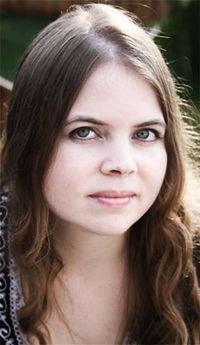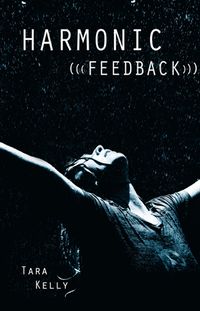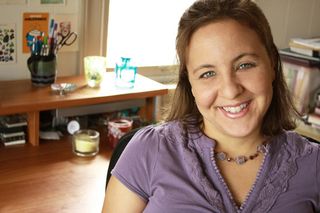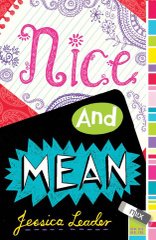SBBT Stop: Paolo Bacigalupi
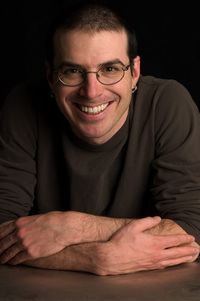 I'm excited to have one Paolo Bacigalupi stopping by today, fresh off last weekend's Nebula Best Novel win for his first novel The Windup Girl. Here he'll be talking about his young adult debut, the recently-released Ship Breaker. Set in a Gulf Coast region transfigured and supremely dystopian, the book follows teen copper wiring scavenger Nailer as he's confronted with an opportunity to escape his brutal circumstances. A welcome–and rare–dystopia set in America; I'd say more but I'll be reviewing this book elsewhere in more detail soon. So instead I'll say, welcome to Paolo.
I'm excited to have one Paolo Bacigalupi stopping by today, fresh off last weekend's Nebula Best Novel win for his first novel The Windup Girl. Here he'll be talking about his young adult debut, the recently-released Ship Breaker. Set in a Gulf Coast region transfigured and supremely dystopian, the book follows teen copper wiring scavenger Nailer as he's confronted with an opportunity to escape his brutal circumstances. A welcome–and rare–dystopia set in America; I'd say more but I'll be reviewing this book elsewhere in more detail soon. So instead I'll say, welcome to Paolo.
GB: As I always do, I'll start by asking you about your writing process with this book. How did you approach it?
PB: In terms of how I actually wrote it, I wrote the first draft in a little over a month, while I was waiting for feedback on another novel, THE WINDUP GIRL. I knew that I wanted to have a new novel to take to a writer's retreat called Blue Heaven, and the deadline was looming. And I was also looking to write something really different, and sort of cleanse my palate from all of the brutality that populates most of my writing. So, there was an onrushing deadline, I was looking to something different, and I'd been kicking a bunch of ideas around in my head that sounded good in theory–everything from what role I think science fiction should play in the world, to thoughts about adventure stories and environmental topics–but I also knew that I needed to either put up, or shut up. And this seemed like the moment when I could put those ideas to the test.
I think the other thing that was going on was that I'd been getting poked at by a lot of people in science fiction because I write such grim stories. The typical comment was along the lines of: "After I read a Bacigalupi story, I want to slit my wrists," which I'm actually quite proud of–but I also wanted to play with emotional notes other than despair and fear. The problem is that I don't really think adults deserve to live in anything other than despair and fear, because frankly we're entirely too self-satisfied as it is. So I sure wasn't going to write anything remotely upbeat for them. But the criticism also seemed to have some validity to me, and I realized that I was okay with writing something more inspirational (I hope) for young people, because, well, they haven't turned into selfish short-sighted adults yet.
At any rate, I think in a lot of ways I'd been prewriting the story, maybe for years, because it went fast. I wrote eight hours a day, mostly at a standing desk, and If I remember correctly the soundtrack was Daddy Yankee, Sean Paul, T.I., and Avril Lavigne. I don't normally write with either this much speed, or this much clarity, but I think I was so grateful not be working on the other book that I could give myself more permission to play with this one, and that was the other thing that was very different from my normal process–I really enjoyed writing SHIP BREAKER. Normally, my writing process features a lot of self-loathing and doubt, but with SHIP BREAKER, it was different. I had a lot of clarity about what I wanted to do, and the voice that I would use, and how I thought the story would move. There were some big discoveries and surprises for me as I worked through it, and it didn't turn out the way that I intended, because ultimately the ideas and themes veered off and the characters changed things as they went, but the bones of the thing were already there, waiting for me to discover and build upon. I doubt I'll ever get to write a book quite like this one again, but boy, I sure liked it.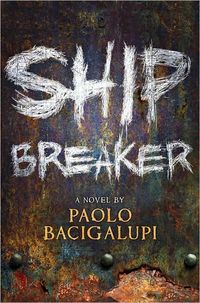
GB: I know you and I have talked about this before, but you see a real void in the marketplace of books for teen boys. Do you want to talk a little bit about that and how it inspired Ship Breaker?
PB: It was actually my wife who made me aware of this. She's a middle-school teacher, and she kept coming home from work and describing how reluctant her boy students were to read. When I asked her what books she was trying to hook them with, she named a lot of really good, really literary, really respectable books. Smart and sensitive and nuanced books.
They were also books with a distinct lack of ass-kicking.
Now, maybe we should leave it to other people to pick apart the question of why boys are all playing Grand Theft Auto and Halo3 and Left 4 Dead, and not reading and not going on to college, but my personal sense when I look at the sorts of good, literarily respectable books that we try to convince kids to read with, is that these look sort of boring in comparison to what's happening on other media. We might not think GTA is civilized, but damn, its compelling. So about the time a 13-year-old boy is teaching you how to use the chainsaw to kill some gangster on the PlayStation–because, you know, he's already mastered that particular challenge–you've got to think that our literature for young people has failed to adapt. And it seems to have failed to adapt particularly for boys. Not all boys. Insert any number of caveats, here, because I think there are a lot of legitimate ones. But at root, the things we consider young adult literature seems to have veered away from ass-kickery, and in the process it's sort of left part of our population wandering around and becoming both less lettered, and given what I'm seeing in video games, also less civilized.
So in addition to all the other things I wanted to do with SHIP BREAKER, I wanted to create a world where Nailer has to kick some ass to get what he wants. I hope it's not as misanthropic as Grand Theft Auto seems to me, but I definitely wanted physical conflict to be part of the story. So SHIP BREAKER has knife-fights and sea battles and the bio-engineered warbeasts called half-men that are a lethal mix of tiger and dog and hyena and human, because those are the things that make me geek out, and also aren't really celebrated in literature so much. But honestly, I don't think it's really only boys who are missing some of this ass-kickery, because I know plenty of girls who are looking for something other than a vampire love affair as well–but yeah, I definitely think that if I were a boy growing up in today's literary environment that I would probably end up wandering off into video games instead of books, because the things that really entice me are on Xbox and PlayStation in abundance, and seem to be somewhat disdained in literature.
GB: I'm curious whe ther you feel there's a difference in how you come at your work for adult SF readers vs. your YA work?
PB: I think for me, the biggest difference is the tone. When I write for YA, I'm comfortable giving my characters a chance to succeed, and maybe even make their world a little better. Teens still have choices about how they shape their lives, and they still have a chance to make their world better, so I'm happy to write something that's gritty, but also inspiring. But when I write for adults, I mostly just want to use my writing to reach into their guts and twist and twist and twist until they can't stand it anymore. Frankly, I don't think adults deserve happy endings, or escape. We're already far too busy feeling self-satisfied while we rip the planet to shreds to really deserve a whole lot of comfort. So yeah, the difference is really that when I write for teens, I can still feel morally comfortable giving them a story with a "win." With adults, the only real win will be when I our kids come home one day and kick us in the teeth for the world we're handing off to them. I'm sort of hoping to inspire that in young people as well.
GB: What are you working on now? What's next?
PB: Ship Breaker II – The Drowned Cities. After that… it's a little up in the air. I've got a two-book deal with Night Shade to write some more science fiction for adults, and I've got some more YA ideas that I'm really excited about, but you know, if you talk too much about them before they exist, they sound stupid and evaporate. I'm afraid it's all going to be sekrit projekts for a while, here.
GB: And, last, plug some other people's stuff–what have you been reading/watching/listening to that you think other people should dash out and get?
PB: If you've never seen the Edward Burtinsky documentary called "Manufactured Landscapes" I highly recommend it. It was one of the inspiration points for SHIP BREAKER and it just blew me away.
I read and loved FEED by MT Anderson. I can't recommend that one highly enough.
And, well, it's sort of embarrassing, but I've been rather enjoying the Gossip Girl books. It's my new addiction.
Thanks, Paolo!
Visit today's other SBBT stops:
Julia Hoban @ Chasing Ray
Stacy Kramer @ A Chair, A Fireplace & A Tea Cozy
Nancy Bo Flood @ Finding Wonderland
Sarah Kuhn @ Bildungsroman
Jenni & Matt Holm @ Hip Writer Mama
SBBT Stop: Paolo Bacigalupi Read More »
